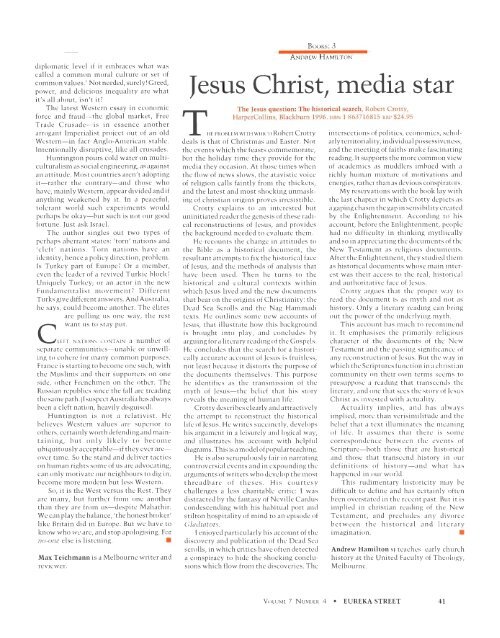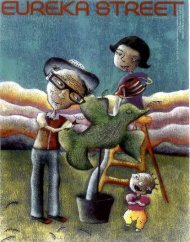n - Eureka Street
n - Eureka Street
n - Eureka Street
Create successful ePaper yourself
Turn your PDF publications into a flip-book with our unique Google optimized e-Paper software.
BooKs: 3diplomatic level if it embraces what wascalled a common moral culture or set ofcommon values.' Not needed, surely! Greed,power, and delicious inequality are whatit's all about, isn't it1The latest Western essay in economicforce and fraud- the global market, FreeTrade Crusade-is in essence anotherarrogant Imperialist project out of an oldWestern- in fact Anglo-American stable.Intentionally disruptive, like all crusades.Huntington pours cold water on multiculturalismas social engineering, as againstan attitude. Most countries aren't adoptingit- rather the contrary-and those whohave, mainly Western, appear divided and ifanything weakened by it. In a peaceful,tolerant world such experiments wouldperhaps be okay-but such is not our goodfortune. Just ask Israel.The author singles out two types ofperhaps aberrant states: ' torn' nations and'cleft' nations. Torn nations have anidentity, hence a policy direction, problem.Is Turkey part of Europe? Or a m ember,even the leader of a revived Turkic block?Uniquely Turkey; or an actor in the newFundamentalist m ovement ? DifferentTurks give different answers. And Australia,he says, could becom e another. The elitesare pulling us one way, the restwant us to stay put.CLEFT NATIONS CONTAIN a number ofseparate communities-unable or unwillingto cohere for many common purposes.France is starting to become one such, withthe Muslims and their supporters on oneside, other Frenchmen on the other. TheRussian republics since the fall are treadingthe sam e path. (I suspect Australia has alwaysbeen a cleft nation, heavily disguised).Huntington is not a relativist. Hebelieves Western values are superior toothers, certainly worth defending and maintaining,but only like ly to becom eubiquitously acceptable-if they ever areovertime. So the stand and deliver tacticson human rights some of us are advocating,can only motivate our neighbours to dig in,becom e more modern but less Western.So, it is the West versus the Rest. Theyare many, but further from one anotherthan they are from us- despite Mahathir.We can play the balance, 'the honest broker'like Britain did in Europe. But we have toknow who we are, and stop apologising. Forno-one else is listening.•Max Teichmann is a Melbourne writer andreviewer.ANDREW H AMILTONJesus Christ, media starT HE PROBLEM WITH WHIC H Robert CrottyThe Jesus question: The historical search, Robert Crotty,HarperCollins, Blackburn 1996. ISBN 1 8637168 15 RRP $24.95intersections of politics, economics, scholdealsis that of Christmas and Easter. Not arly territoriality, individual possessiveness,the events which the feasts commemorate, and the m eeting of faiths make fascinatingbut the holiday time they provide for the reading. It supports the more common viewm edia they occasion. At those times when of academics as muddlers imbued with athe flow of news slows, the atavistic voice richly human mixture of motivations andof religion calls faintly from the thickets, energies, rather than as devious conspirators.and the latest and most shocking unmask- My reservations with the book lay withing of christian origins proves irresistible. the last chapter in which Crotty depicts asCrotty explains to an interested but a gaping chasm the gap in sensibility createduninitiated reader the genesis of these radi- by the Enlightenment. According to hiscal reconstructions of Jesus, and provides account, before the Enlightenment, peoplethe background needed to evaluate them . had no difficulty in thinking mythicallyHe recounts the change in attitudes to and so in appreciating the documents of thethe Bible as a historical document, the N ew Testament as religious documents.resultant attempts to fix the historical face After the Enlightennent, they studied themof Jesus, and the methods of analysis that as historical documents whose main interhavebeen used. Then h e turns to the est was their access to the real, historicalhistorical and cultural contexts within and authoritative face of Jesu s.which Jesus lived and the new documents Crotty argues that the proper way tothat bear on the origins of Christianity: the read the document is as myth and not asDead Sea Scrolls and the Nag Hammadi history. Only a literary reading can bringtexts. He outlines some new accounts of out the power of the underlying m yth.Jesus, that illustrate how this background This account has much to recommendis brought into play, and concludes by it. It emphasises the primarily religiousarguing for a literary reading of the Gospels. character of the documents of the NewHe concludes that the search for a histori- Testament and the passing significance ofcally accurate account of Jesus is fruitless, any reconstruction of Jesus. But the way innot least because it distorts the purpose of which the Scriptures function in a christianthe documents themselves. This purpose community on their own terms seems tohe identifies as the transmission of the presuppose a reading that transcends them yth of Jesus-the belief that his story literary, and one that sees the story of Jesusreveals the m eaning of human life.Christ as invested with actuality.Crotty describes clearly and attractively Actuality implies, and has alwaysthe attempt to reconstruct the historical implied, more than verisimilitude and thelife of Jesus. He writes succinctly, develops belief that a text illuminates the meaninghis argument in a leisurely and logical way, of life. It assumes that there is someand illustrates his account with helpful correspondence between the events ofdiagrams. Thisisa model of popularteaching. Scripture-both those that are historicalHe is also scrupulously fair in narrating and those that transcend history in ourcontroversial events and in expounding the definitio ns of his tory-and what hasarguments of writers who develop the most happened in our world.threadbare of theses. His courtesy This rudimentary historicity may bechallenges a less charitable critic: I was difficult to define and has certainly oftendistracted by the fantasy of N eville Cardus been overstated in the recent past. But it iscondescending with his habitual port and implied in christian reading of the Newstilton hospitality of mind to an episode of Testament, and precludes any divorceGladiators.between the his t orical and literaryI enjoyed particularly his account of the imagination. •discovery and publication of the Dead Seascrolls, in which critics have often detecteda conspiracy to hide the shocking conclusionswhich flow from the discoveries. TheAndrew Hamilton SJ teaches early churchhistory at the United Faculty of Theology,Melbourne.VoLUME 7 N uMBER 4 • EUREKA STREET 41
















